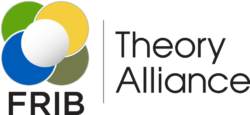DTP-TALENT 2025 | Quantum Computing for Nuclear Physics

Aula Renzo Leonardi - Villa Tambosi
Str. delle Tabarelle, 286, 38123 Villazzano TN
Villazzano
For nuclear theorists, the overarching challenge is to develop a comprehensive description of nuclei and their reactions, grounded in the fundamental interactions between the constituent nucleons with quantifiable uncertainties to maximize predictive power. As experimental frontiers have shifted to the study of rare isotopes, the predictive power of successful phenomenological approaches like the shell model and density functional theory is challenged by the scarcity of nearby experimental data to constrain model parameters. Therefore, it is expected that few-body and many-body methods will play an increasingly prominent role to help improve the predictive power of such “data driven” methods as experiment moves deeper into largely unexplored regions of the nuclear chart.
To understand why nuclear matter is stable, and thereby shed light on the limits of nuclear stability, is one of the overarching aims and intellectual challenges of basic research in nuclear physics. To relate the stability of matter to the underlying fundamental forces and particles of nature as manifested in nuclear matter, is central to present and planned rare isotope facilities. From a theoretical standpoint, this involves understanding how the basic building blocks of Nature interact and conspire to build up atomic nuclei as we know them, with the aim to understand what makes visible matter stable. The theoretical efforts span from methods like lattice quantum chromodynamics, via effective field theories to many-body theories applied to atomic nuclei and infinite nuclear matter. All these methods rely on theoretical approximations whose applicabilities are often limited by the dimensionality of the specific problem being studied. In recent years, there has been considerable progress in developing quantum-computing algorithms applied to quantum many-body systems, with the hope to circumvent many of the classically intractable problems.
This Nuclear Talent school aims to bring together the efforts of nuclear many-body theorists, quantum information theorists, and mathematicians in order to present and discuss algorithms for studying nuclear systems using recent progress in quantum information theory.
Supporting Institutions

Organizers
-
Morten Hjorth-Jensen (Michigan State University (USA))
-
Alexei Bazavov (Michigan State University)
-
Dean Lee (Michigan State University)
-
Ryan LaRose (Michigan State University)
-
Alessandro Roggero (Università degli Studi di Trento)
-
Zohreh Davoudi (University of Maryland)
Student Coordination
- Morten Hjorth-Jensen
- Alessandro Roggero
Registration
RegisterRegistration available until 11/04/2025.
_______________________________________
Application for the ECT* DTP-TALENT 2025 should be made electronically through the webform.
Application should include:
- Curriculum vitae
- Description of academic and scientific achievements
- Short letter expressing the applicant’s personal motivation for participating in the programme
In addition, a reference letter from the candidate’s supervisor, addressed to “Prof. Ubirajara van Kolck, Director of ECT*”, should be sent by email to –
Students are welcome to arrive on June, 15th. The checkout time is fixed in July, 5th.
°°°°°°°°°°°°°°°°°°°°°°°°°°°°°
The collection of applications will end on April 11, when registration closes.
Applicants will be notified of the selection results within the next two weeks.
A committee composed of the scientific Organizers and the Director of ECT* will select participants.
The selection criteria will cover both formal and merit aspects:
- compliance with the submission date
- completeness of the required documentation
- evaluation of merit measured on the basis of the CV, documented scientific achievements, and letter of support
In order to promote the participation from under-represented groups in Nuclear Physics and Related Areas ECT* may provide modular scholarships as a contribution to facilitate the attendance of selected candidates.
An additional requirement for this possible subsequent selection will be the consideration of participants based in underrepresented countries and with a certifiable lack of access to research funds at affiliating institutions.
PhD students and ECRs based in Trento are allowed to apply for TALENT-DTP programs but are not eligible for financial support.